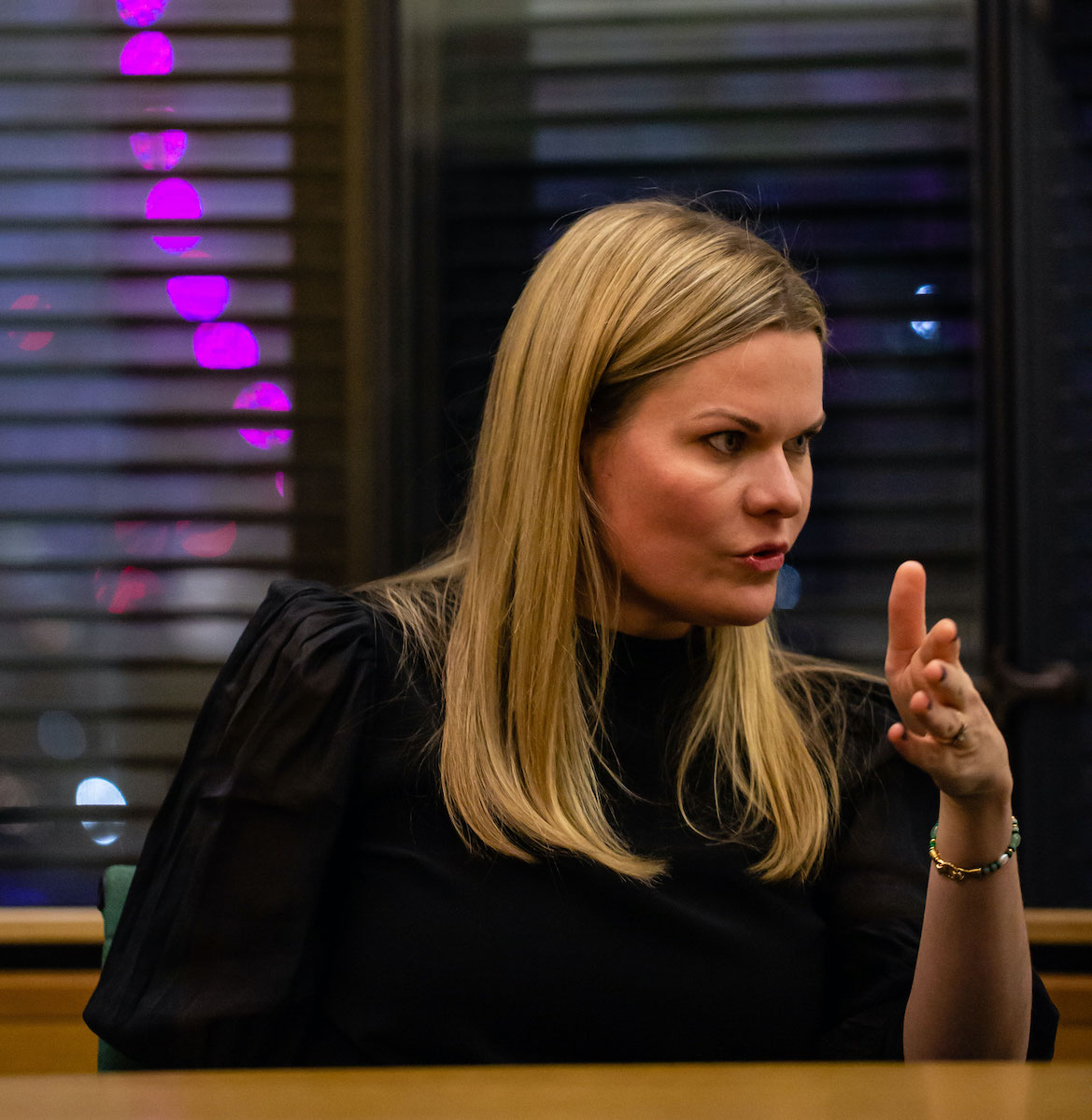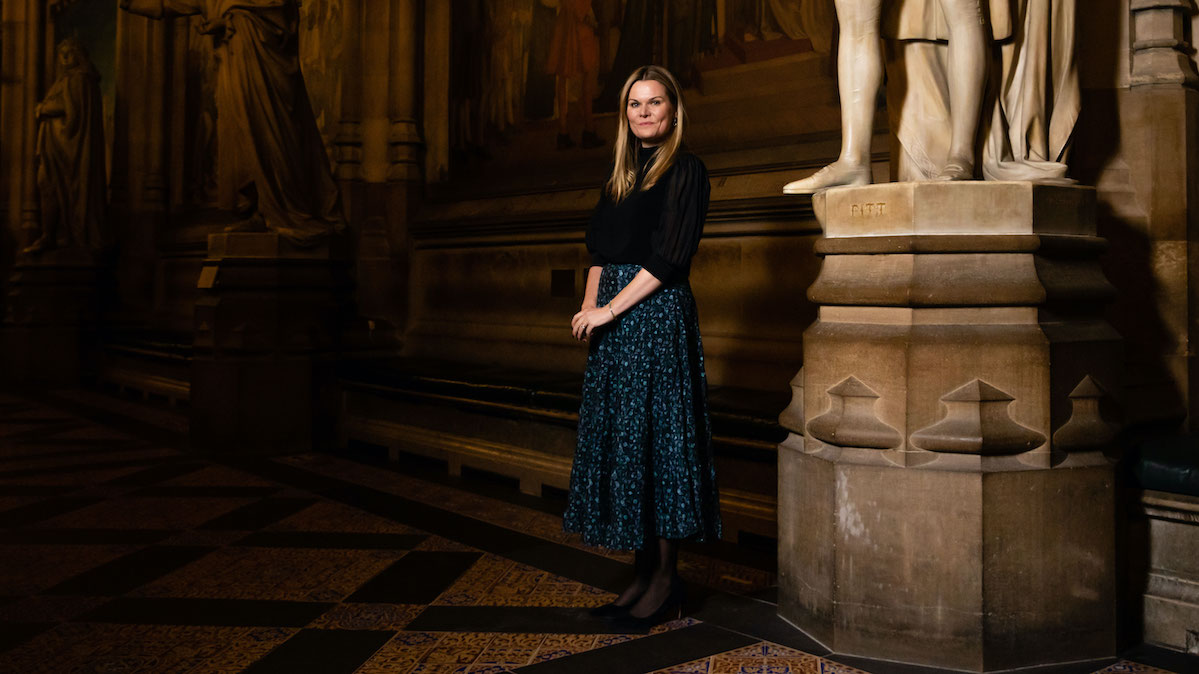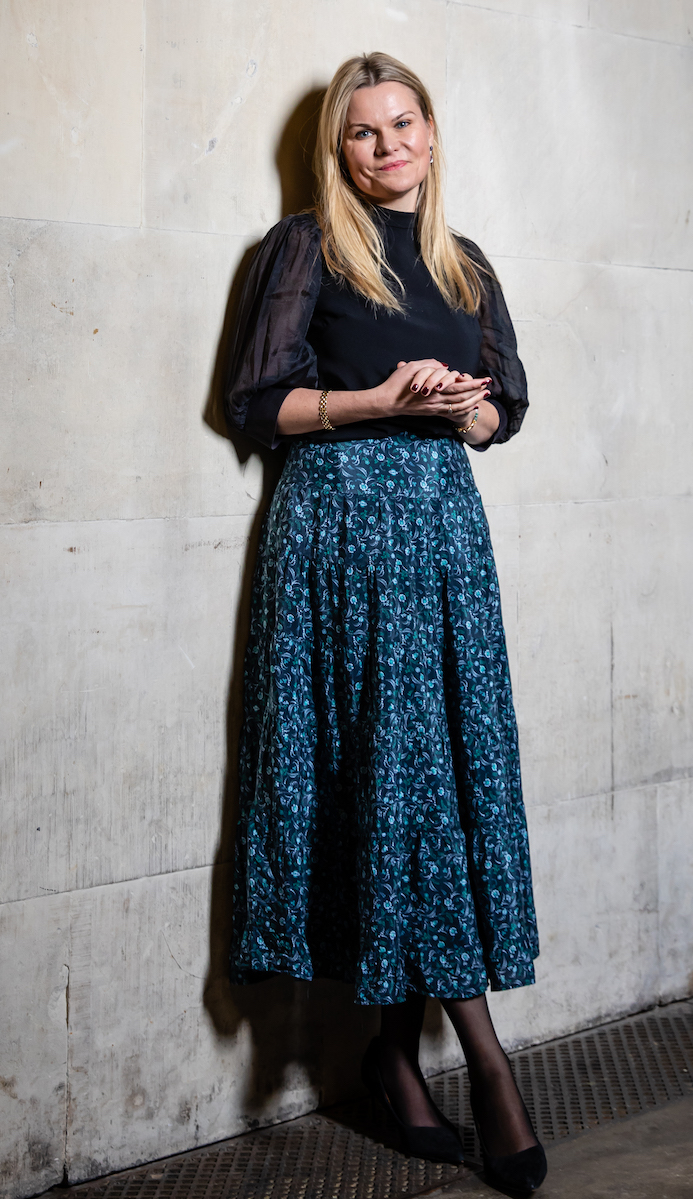The Laura Farris interview: ‘My politics were a little more left leaning when I was young’
Photography by Louise Haywood-Schiefer
11 min read
Following her father as Conservative MP for Newbury, new minister Laura Farris tells Tali Fraser she won’t let tribal loyalty – or anything else – stop her from working to help victims of crime. Photography by Louise Haywood-Schiefer
Laura Farris has seen both sides of her new brief as minister for victims and safeguarding. The 45-year-old was practising as a successful barrister before she was elected in 2019, and just two years later she was writing her own victim impact statement.
It recorded the effect of receiving a malicious email from a constituent, referencing a samurai sword attack at the office of Lib Dem MP Nigel Jones, which led to the death of his political aide, Andrew Pennington, drawing parallels with the killer’s state of mind. The man was convicted and received a suspended sentence. In her statement Farris wrote: “I feared for my and my family’s safety … if I see someone walking past my window I always worry it’s him.”
Her voice falters as she describes the experience: “I know that I have not had it as bad as some of my colleagues, but it does really disconcert you. It does make you question why you’re doing a job where that is a feature of it.
“I still think the public discourse towards politicians is really unhealthy. I know some MPs’ conduct has not helped that. But, ultimately, it is just a job like any other … and it is still the case, when you talk to the Met service here, that women MPs get about, on average, four times more abuse than their male counterparts.”
Advertising Revenue helps fund our journalism.
Please consider disabling your ad blocker.
Although the abuse “can get you down”, Farris adds “it is one of the few things that really join us MPs together across parties”.
Whereas some of her fellow 2019 intake have taken to partisan social media wars, the Newbury MP recently appointed to her first ministerial role working across the Ministry of Justice and the Home Office has been notable for her willingness to work across the party divide.
One of her closest cross-party relationships is with Labour’s Harriet Harman. “It is a friendship,” Farris says – and it is what spurred her to intervene during a heated Commons debate about the Privileges Committee’s report into former prime minister Boris Johnson, which Harman helmed, to pay tribute to her work on the committee and career as a whole, and move her friend to tears.
Did she expect it to have such an emotional effect?
“I didn’t. I didn’t really think about it. I just thought it was an important corrective to people who were undertaking what was actually, frankly, a thankless task … I just thought the process, and Harriet personally, was due a bit more respect.”
 Laura Farris during her interview with The House
Laura Farris during her interview with The House
Harman was one of the first MPs Farris worked with upon entering Parliament in an effort to shape the Domestic Abuse Act. The year before she was elected, Farris took note of the “really brutal, really hideous” case where Natalie Connolly, 26, was killed by John Broadhurst, 13 years her senior, during what he claimed to be “rough sex”.
Broadhurst was convicted of manslaughter and only received a sentence of three years and eight months, which is less than the maximum sentencing for pet theft. “I was seething over the injustice of that case,” Farris says – and you can still sense it now.
Having discussed the issue with a group of girlfriends, all of whom were lawyers, she was determined to change the law around rough sex when she became an MP.
“I found out that Harriet was trying to get an amendment to the act, alongside Tory MP Mark Garnier, so I asked her to get involved … it was good cross-party collaboration, and we got it on the bill,” Farris says, with a clear sense of pride.
Perhaps unsurprisingly this bi-partisanship is not universally popular with her colleagues, nor with her opponents on the right.
Reform UK leader, Richard Tice, says: “voters will look in despair” at her “woke” appointment because in 2020 she took the knee to show her support for Black Lives Matter. His criticism was echoed by anonymous Tory MPs.
I just thought the process, and Harriet personally, was due a bit more respect
The event she was photographed at was an anti-racism gathering in her constituency, and Farris was glad to attend: “I just thought it was really important to be receptive to other people’s voices. I appreciate the crime [the murder of George Floyd] took place in the United States and I’m not drawing equivalence, but people there were giving their view about structural, systemic experiences of what it was like to be a young Black man through the criminal justice system or through the care system.
“I was totally ready to listen to those voices. I don’t think that’s antithetical to being an MP; I think that’s core to being an MP and why you go into public service.”
The irony for those who criticise Farris for being insufficiently partisan is that she is a Tory dynast. Not only was her uncle a Tory MP but her father, Sir Michael McNair-Wilson, was the MP for Newbury, now Farris’ own constituency.
“It was a highly emotional moment,” she says, to follow in her late father’s footsteps, as he died when she was just 14 years old. When his old seat became available at the 2019 general election, the Farris family Whatsapp group “lit up” with messages: “They were all saying, ‘you have to go for this!’”
Farris’ sense of public service is a key thread throughout her career. From what she saw of her father’s time as an MP in dealing with the Hungerford massacre (which saw 16 people shot dead in his constituency) and the gun law reform that followed, to her “amazing time” working as an intern and researcher for Hillary Clinton.
“She and Bill had just left the White House. He was running the Clinton Foundation in the Bronx and I had an office there, while she had gone from being first lady to senator, so you’re working for a politician who was very high profile, but nonetheless, the work I was doing was constituency work,” Farris says.
It was then that she realised: “I would probably have a go at running for office one day.”

Farris dodges the question of whether, were she in the US now, she would be a Democrat or a Republican, instead admitting “my politics were a little more left leaning when I was young”. Although she does highlight that Clinton herself even worked for what was eventually her opposition party when she was a young student, taking a placement with former Republican president Gerald Ford.
“Hillary used to do question and answers with her junior staff and she said that [experience] had been a very formative moment for her.”
Perhaps Farris will follow in a similar track of running for high office, I suggest – “maybe I’m going to be president of the United States!” she jokes.
Until then, her new ministerial job sees her stretched across both the Home Office and the Ministry of Justice, with a focus on victims and safeguarding.
“There are really important things in the victim experience and I know it because I was a backbencher for four years, arguing for this stuff,” she says.
During her time on the Home Affairs Select Committee, for example, Farris secured the national rollout of section 28 evidence procedures, something, Farris says in a hushed tone, “some lawyers don’t like because they have to do extra work”.
It means someone could give their evidence behind closed doors and ahead of the trial date: “Your involvement can be at an end. You don’t have to go into a scary courtroom, you don’t have to relive, you can move on with your life.”
People were giving their view about structural, systemic experiences of what it was like to be a young Black man...I was totally ready to listen
More recently, a group of cross-party MPs have written to Justice Secretary Alex Chalk to ask that the law be changed to prevent rape victims and bereaved families from paying thousands of pounds to access transcripts from their Crown Court proceedings, should they not want to attend themselves, citing the case of a rape victim who was quoted £7,500 for the transcript of their 10-day trial. Can this be right?
“I have talked about it with the Justice Secretary,” Farris says, but “it would come at a significant cost to the MoJ” and, in the context of a court hearing, the transcripts would be showing “lots of bits that are quite procedural”.
What Farris is pushing for instead is “greater transparency” around accessing transcripts of sentencing remarks specifically – and she says: “I think they should be completely available for victims.”
It is the sentencing remarks from the judge in the event of a conviction that Farris believes “are extraordinarily powerful” but “not easy to obtain”.
“On some of my campaigns, when I have been looking for sentencing remarks, it’s taken us six weeks and cost £150 to get them and they are absolutely illuminating. They go far further than the press reports, gather all the evidence; one of the things I have discussed with the Justice Secretary is making it much more freely available for people to get their sentencing remarks,” she says.
MPs have also raised the issue of rape victims not accessing early mental health support because their therapy notes have the potential to be requested as part of a criminal investigation, which Farris, typically considered, says she is “very much listening to”.
But having spoken to a “very senior barrister”, Farris says she was told such cases are “vanishingly rare”, although it can be “somewhat unpredictable” as to how a judge applies the threshold to access such notes: “So I am not sure how I’m going to end up on this yet.”
Farris adds: “Sometimes there is a bit of a discrepancy between somebody who’s practising in an area of the law and what you have brought to you in Parliament.”
It is a mismatch she noticed when she was challenged in the Commons over her views on the European Convention on Human Rights (ECHR). “I am probably the Member who has most recently been in the immigration tribunals, so I have an idea,” she hit back at critics of her argument during a debate as the Illegal Migration Act made its way through Parliament.

While on the backbenches, she had been defending her belief that “the reason nobody can give me an example of the European Court interfering with a material change to our domestic immigration laws is because there isn’t one”. Is it a mistake then to entertain the idea of leaving the ECHR?
“I have been reading Jonathan Sumption quite a bit recently,” she explains. The former Supreme Court judge has argued in favour of leaving the ECHR and replacing it with a domestic code of basic rights.
Farris adds: “All I’ll say, is that I think there is an issue – and I just want to echo the point that the Supreme Court decision wasn’t all about the ECHR – there is a legitimate question a government can ask itself, when it’s trying to achieve something quite fundamental like border control, about its relationship with supranational institutions.”
Although not exactly a fulsome declaration of support for withdrawal from the ECHR, it does mark an interesting shift in the tone of message coming from a Tory moderate – even if it is coming from a member of government.
Farris flags the “common tension points” that arose during her time working on asylum tribunals, particularly with the UN 1951 Refugee Convention: “The language that it protects anyone with a well-founded fear of persecution – that’s the core principle – in the day of modern migration, climate change, conflict, and easyJet means that it isn’t unreasonable that people are asking, and they’re asking it all across Europe, whether or not those principles, which were basically Second World War principles, are going to be good for the century going forward.”
In any future Conservative leadership contest, would winning be possible without declaring an intention to leave the ECHR? “I think lots of Conservative MPs have a lot of respect for international institutions and for those protections. I think people are really thoughtful and reflective on this,” she says.
It sounds like the One Nation voice, which Farris once tweeted she would “strive to be” in Parliament, still remains at heart.
